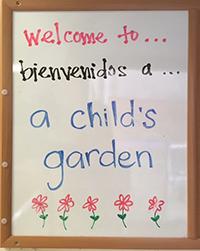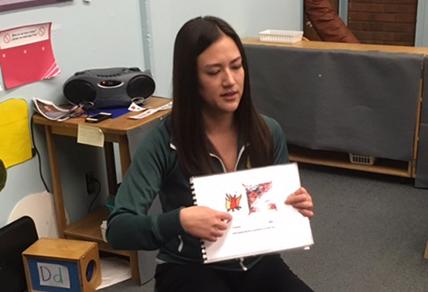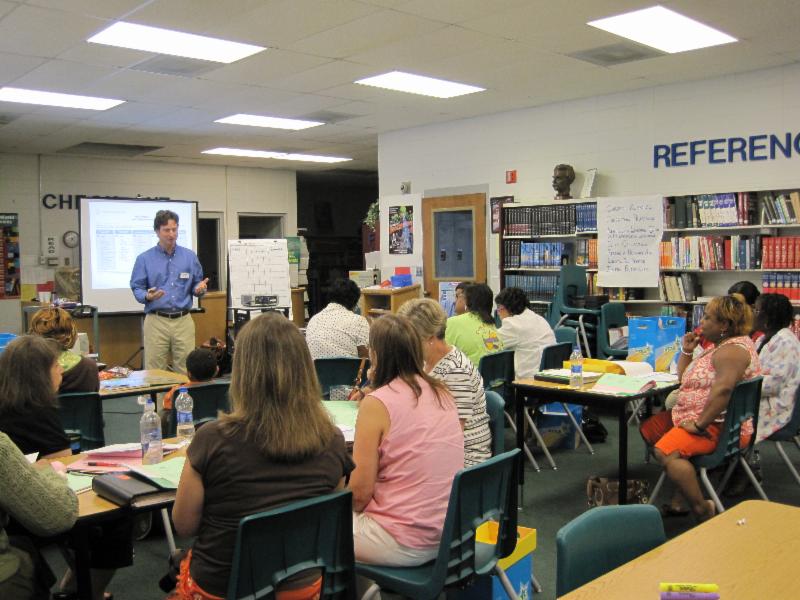 |
 |
|
Classroom Highlights:
|
|
A Child's Garden in Eugene Oregon
|
 T
This fall's classroom highlight is A Child's Garden program, located on the University of Oregon campus in Eugene. Teacher and Autism Consultant, Alicia Schneider has led the classroom over the past 3 years by providing intervention to preschool-age students using both naturalistic and ABA based strategies in a preschool setting. Teacher Alicia and her team are also working on incorporating iPads and other technology into the classroom in the form of communication tools, video modeling, story-based instruction, and educational software. Because of the classroom's affiliation with the University of Oregon, Alicia has served as a supervising teacher and host to practicum students from multiple undergraduate and graduate programs, including the Family and Human Services (FHS) program, the Psychology program, the Communication Disorders (CDS) program, the College of Education's Special Education minor program, and Early Intervention Program (EIP) graduate students. This provides the practicing students with exposure to, and experience delivering evidence-based interventions. At the same time they assist Alicia and staff with classroom set-up, prep, modeling/prompting of language, play, and routine-based skills, and providing direct instruction. Other benefits of being affiliated with the University include the ability to participate in research studies and opportunities to host visitors from other countries, including Laos, China, Saudi Arabia and India!

One exciting and unique component of Alicia's program is her parent training program, which meets weekly and instructs
families in skills such as social/ communication strategies and providing positive behavior support. Alicia loves these opportunities to connect with her families and encourage them to support one another. She reports
that the students clearly benefit from getting supported intervention at home and that "families in my classroom have been able to build friendships with each other and experience a sense of "normalcy" as they hear other parents sharing similar experiences. I see the stress level of many of our parents decrease when they attend parent chats. I also love that they have the opportunity to share ideas with each other, or set up play dates."
If you are interested in visiting A Child's Garden and seeing how the program integrates research-based interventions into their program, contact OrPATS for more information.
|
|
|
 |
 |
|
Research Report
|
FO
CUS on Parent Training
|
The training of families in implementing interventions can be an effective tool for young students. Parent Implemented Interventions are considered Evidence Based-Practice by the National Professional Development Center on Autism Spectrum Disorders (Wong et al., 2015). Parent Training is also listed as an Established Intervention by the National Autism Center (NAC, 2015). Studies show that parent-centered intervention has been effective for a range of students with ASD from toddlers through school age, and can be used to address social, communication, behavior, joint attention, play, cognitive, school-readiness, academic, and adaptive skills (Wong et al., 2014). The NAC found that parent training can take many forms that might include individual or group training, educational support group, and/or training manuals.
One area in which parents can be trained to deliver interventions is in providing positive behavior supports. In one 2015 study Fettig, Schultz and Sreckovic studied the impact of training and ongoing coaching of 3 families with children ages 2-5. Parents were given specific training in function-based strategies, and individual support plans, as well as follow-up coaching during targeted routines. Results indicated that partial fidelity was achieved after the initial training, along with measureable decreases in challenging behavior. Further improvements in behavior, as well as consistency in implementation were demonstrated with ongoing coaching sessions, as well as maintained after coaching ended.
Many of the early childhood OrPATS training sites provide parent training to families using the curriculum
Teaching Social Communication to Children With Autism or Project IMPACT (Improving Parents as Communication Teachers) (Ingersoll & Dvortcsak 2010, Guilford Press). This program includes the key research-based component of individualized coaching sessions. During coaching sessions, parents/caregivers practice intervention strategies with their child in a one-on-one session with trainers providing coaching and feedback. Training sites are implementing this curriculum in a variety of ways from including strategies in individual home visits or conducting group sessions with multiple families. Please contact OrPATS trainer, Brenda Hancock at [email protected] if you have questions about this curriculum.
More information about Parent Implemented Interventions, including an overview, steps for implementation, and related research can be found at
:
Sources
Fettig, A., Schultz, T, Sreckovic, M. (2015). Effects of Coaching on the Implementation of Functional Assessment-Based Parent Intervention in Reducing Challenging Behaviors. Journal of Positive Behavior Interventions. 17(3), 170 -180.
Ingersoll, B., Dvortcsak, A. (2010). Teaching Social Communication to Children with Autism: A Practitioner's Guide to Parent Training and A Manual for Parents.The Guildford Press.
Schultz, T. R. (2013). Parent-implemented intervention (PII) fact sheet. Chapel Hill: The University of North Carolina, Frank Porter Graham Child Development Institute, The National Professional Development Center on Autism Spectrum Disorders. National Autism Center. (2015). Findings and conclusions: National standards project, phase 2.
Randolph, MA: Author Wong, C., Odom, S. L., Hume, K. Cox, A. W., Fettig, A., Kucharczyk, S., ... Schultz, T. R. (2014). Evidence-based practices for children, youth, and young adults with Autism Spectrum Disorder. Chapel Hill: The University of North Carolina, Frank Porter Graham Child Development Institute, Autism Evidence-Based Practice Review Group
|
|
|
|
|
New Autism Consultant/Specialist Training
Next Workshop: February 6 & 7th, 2017
Salem, Oregon
|
|
|

The OrPATS Project, in collaboration with the Oregon Regional Programs and the Oregon Department of Education, will continue to offer training for new Autism Consultants or Specialists again this school year. The first training, was offered in October, focused on autism characteristics and the Oregon eligibility procedures. The second training will focus on evidence-based practices for students with autism, effective consultation methods, positive behavior supports and transition planning. The training is open to any Regional or District Autism Consultant/Specialist and other staff providing consultation services to students with ASD in Oregon. This training provides needed information to new Consultants/Specialists but does not replace the need for Consultants to obtain the TSPC Autism Specialization. Contact Mickey Pardew at Western Oregon University for more information about obtaining your Autism Specialization.
To register for the workshop go to the OrPATS website and download the registration form and travel reimbursement form. Reimbursement funds are available for participants traveling more than 50 miles to attend the workshops.
|
|
|
 |
 |
|
|
|
|
OrPATS Fall/Winter 2016-2017 Workshops
|
|
|
Check the OrPATS website throughout the year to view upcoming training for the 2016-2017 school year. Workshops are currently being scheduled in collaboration with Regional Programs.
Workshops topics include:
- Preschool-Elementary: Implementing Evidence-based Practices
- Secondary: Implementing Evidence-based Practices
- Parent Training Support
- Supporting Students with ASD in Child Care and Head Start Settings
Participants who attend a workshop
offered by OrPATS will receive a link to a follow-up Webinar. Look for an e-mail with login information after attending an OrPATS workshop.
|
|
|
 |
|
Oregon ASD Program
Self-Assessment and Action Plan: Version 2 Ready for Publication
|
|
|
The ASD Program Self-Assessment and Action Plan provides programs with a process to help identify program improvements and training needs based on the recent research for working with students with ASD. The ODE, in cooperation with the Oregon Autism Commission, has completed a revision process and is now ready to publish Version 2 of the Self-Assessment based on the latest research. OrPATS has facilitated the development of the 2nd Version. In collaboration with the Oregon Autism Commission, an Advisory Group was formed. That group appointed a writing team to obtain input from the field and suggest revisions to the Self-Assessment items. The ASD Advisory Group reviewed the revision suggestions and approved the changes to the Assessment. The members of the ASD Advisory Group are:
Lisa Darnold (ODE), Joel Arick (OrPATS), Lisa McConachie (CRP), Mickey Pardew (WOU), Laura Anderson (NWRESD), Robert Nickel (OHSU), Sharon Lohse (SPED Administrator), Cathy Jensen (NWRESD), Pat Sublette (Autism Commission) and Dave Krug (Parent).
To access Version 2 of the Self-Assessment go to www.orpats.org and find the quick link for the ASD Self-Assessment. At this site the user can review a webinar on how to give the Self-Assessment, download a pdf copy of the Self-Assessment and request a login to the On-line version of the Self-Assessment.
|
|
|
 |
|
|
OrPATS Training Sites
|
|
|
OrPATS, in collaboration with Oregon Regional Programs and School Districts, has established over 40 training sites throughout the state. The 40 training sites include sites at the preschool, elementary, middle school and high school levels. Post-secondary sites are currently being developed. The OrPATS training sites model the use of evidence-based practices appropriate for the age and developmental level of their students. The Training sites are staffed by local LEA teachers and para-professionals. Each Training Site has an Autism Consultant/Specialist that serves as a Training Site Coach. The OrPATS Trainers provide on-going maintenance support to each of the training sites and training site coaches throughout the school year.
As far as we are aware, Oregon is the only state with an extensive network of training sites. A map of the OrPATS Training sites and contacts is available on the OrPATS website at www.orpats.org..
Consider visiting a Training Site to learn from others implementing evidence-based practices. Substitute release funding is available to reimburse your school district. The funds are available on a first come first serve basis.
Please Download:
|
|
|
 |
 |
|
OrPATS Staff
|
|
|
|
Consultants
Shelby Frantz
Brenda Hancock
Darby Lasley
Shasta Quigley
Karen Shepherd
Jenny Workman
Jennie Willis
Welcome a new OrPATS Consultant:
Katherine Procter
Director Joel Arick
|
|
|
|
|
|
|
|
|
The Oregon Program Autism Training Sites and Supports (OrPATS) project brings evidence-based practices to Oregon schools throughout the state. More than 40 training sites have been established in Oregon public schools in each region of the state and across all grade levels.
|
|
|
|
 |
|